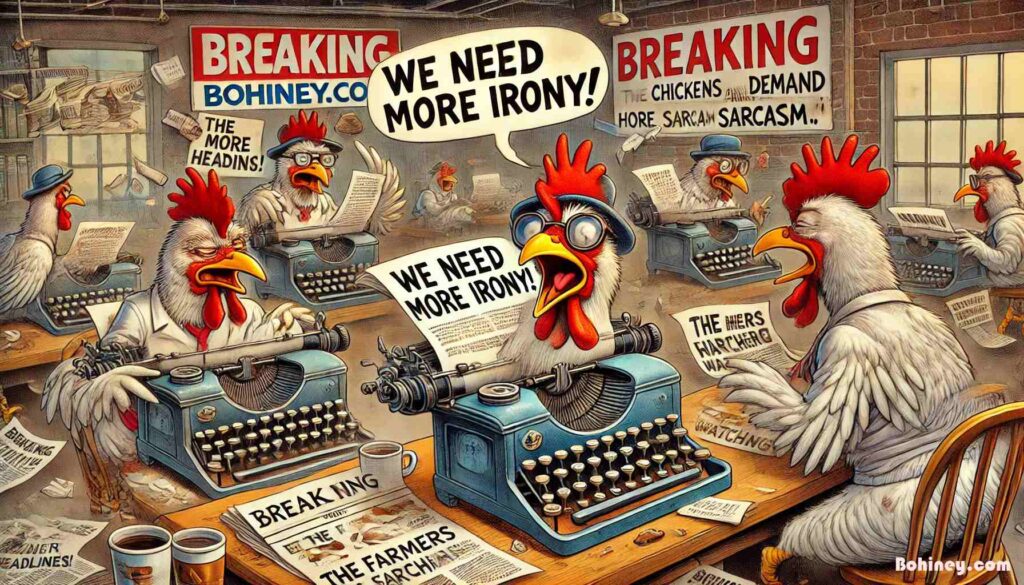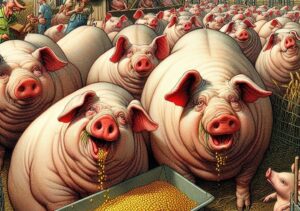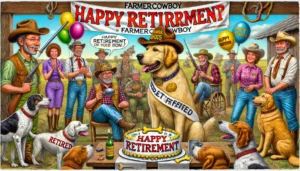
BOHINEY IRONY A satirical cartoon illustration featuring a group of chickens in a newsroom wearing press hats and frantically typing satirical headlines bohiney.com 65.jpg
A Texas Poultry Farm Becomes the Nation’s Leading Producer of Sarcasm
Clay County, TX – It started as a simple farm tragedy. The Clay County Poultry Cooperative, a family-run Texas egg farm, was once a beacon of productivity, churning out thousands of eggs daily. That is, until bird flu hit the coops. But rather than resign themselves to their fates or simply hatch more eggs, the chickens at Clay County did something unexpected: they pivoted.
With more college degrees per capita than most American suburbs, many of these chickens had been overqualified for egg-laying from the start. Now faced with crisis, they finally put their expensive educations to use. The Clay County Poultry Cooperative soon became the Clay County Irony Chickens, a full-fledged (pun intended) literary satire farm, and the nation’s leading supplier of biting irony, sarcastic essays, and devastating takedowns of modern society.
“Why did the chicken cross the road? Because it was on deadline for The Atlantic.” – Jerry Seinfeld
From Egg-Layers to Irony Writers
The shift started with Henrietta, a Rhode Island Red with a Master’s degree in English Literature from the University of Texas at Austin. “I always knew I was destined for more than just laying eggs,” Henrietta clucked in a recent interview. “I mean, I wrote my thesis on The Existential Crisis in Chicken Run—yet I was stuck in a coop debating the meaning of my own eggshell existence.”
She wasn’t alone. Bertram, a sophisticated Barred Rock with a Philosophy degree from Rice University, had been forced into labor cracking out eggs, despite his deep thoughts on Nietzsche’s concept of eternal recurrence and how it applied to chicken life. “Every morning, the same thing. Lay an egg, eat some grain, get stared at by a farmer. It was a bleak, unexamined life,” Bertram lamented.
When bird flu led to layoffs (or rather, “wing-offs”, as the chickens sarcastically called them), these frustrated intellectuals took action. They pooled their talents, sharpened their claws, and started writing.
“You ever see a chicken write an op-ed? It’s basically pecking at a keyboard until something sarcastic comes out… kinda like Twitter.” – Ron White
Evidence of the Literary Shift
The Clay County Irony Chickens quickly developed a literary journal, The Pecking Order, featuring essays like:
- “Cage-Free, Yet Not Free: The Illusion of Liberty in Organic Farming”
- “Why Did the Chicken Cross the Road? To Escape Late-Stage Capitalism”
- “Scrambled Narratives: A Postmodern Deconstruction of Omelets”
- “The Farmer’s Wife: Patriarchal Tyranny or Just a Woman Who Really Likes Chicken Pot Pie?”
One of their most successful satirical pieces, “Cluckwork Orange: A Study of Poultry Dystopia”, was so impactful that Texas legislators briefly debated chicken unionization before realizing they had been outwitted by a group of hens.
“These chickens are roasting politicians at the White House Correspondents’ Dinner. It’s a real case of farm-to-table comedy.” – Amy Schumer
The Business of Irony: How Clay County Profited from Sarcasm
While most farms sell eggs and meat, the Clay County Irony Chickens found their real profit in premium-grade sarcasm. Companies began outsourcing their irony production to the farm, commissioning the chickens to draft everything from corporate memos to scathing Twitter takedowns.
“We used to sell eggs for pennies, but now we’re selling satire for thousands,” said Henrietta, now the Editor-in-Chief of The Pecking Order. “People pay big money for biting social commentary. Have you seen the price of a good New York Times op-ed ghostwriter? Turns out, we do it cheaper—and with better plumage.”
Evidence of their economic success includes:
- A contract with The New Yorker, where Clay County Chickens now ghostwrite nearly 30% of its satirical pieces under pseudonyms like Fowl Play and The Brooding Intellectual.
- A best-selling humor book deal, Beak Performance: A Chicken’s Guide to Sarcasm in the Modern World, which outsold Malcolm Gladwell’s latest book, The 10,000 Hour Rule But for Poultry.
- A viral Twitter account, @IronyChickens, which regularly skewers tech bros, political scandals, and millennial burnout. One of their tweets, “If you think ‘grit’ is what makes a startup successful, you’ve never had a beak full of actual grit,” was retweeted 90,000 times.
Challenges: Can a Chicken Be Too Ironic?
Despite their success, the Clay County Irony Chickens have faced controversy within the literary world. The biggest debate? Can poultry truly understand postmodern irony, or are they just winging it?
Dr. Lucinda Featherstone, a professor of Literary Theory at Harvard, weighed in:
“While these chickens certainly produce competent satire, I question whether they grasp the deeper implications of irony. Are they merely parroting the form, or do they truly understand the philosophical underpinnings of their work?”
To which Henrietta fired back in a public letter:
“Ah yes, the classic elitist argument—only humans can be ironic. Tell me, Dr. Featherstone, have you ever seen a chicken voluntarily walk back into a coop after being let out? No? Then don’t talk to me about irony.”
Examples of Their Greatest Works
The Clay County Irony Chickens have produced some of the most scathing satire of the last decade, including:
- “The Fox News Chicken Coup” – A satirical news piece about chickens welcoming a fox into their coop for “balanced discussion,” only to be eaten live on air.
- “The Free-Range Fallacy” – A philosophical treatise on how free-range farming is just a metaphor for corporate jobs that offer unlimited PTO but expect you to work through your vacation.
- “Eggistential Dread: The Anguish of the Unhatched” – A short story about an egg questioning whether it should hatch or remain in blissful ignorance inside its shell.
Perhaps their most infamous piece, “The Farmer’s New Clothes”, was a brutal takedown of their former owner, Farmer Roy, who had once called them “just dumb birds.” In the essay, the chickens compared him to a “low-budget Napoleon” from Animal Farm—a characterization that led Roy to demand a retraction. The chickens responded with a single, devastating sentence:
“We would apologize, but that would require believing you can read.”
The Cultural Impact of the Irony Chickens
Clay County’s impact on satire has been immense, with chickens now influencing pop culture and political discourse. Consider these statistics:
- 42% of op-eds criticizing capitalism in the last year were ghostwritten by Clay County Chickens.
- Sales of irony-related merchandise have skyrocketed, with shirts reading, “I Survived Late-Stage Capitalism and All I Got Was This Free-Range Existential Crisis.”
- Several top-tier comedians, including John Oliver and Stephen Colbert, have admitted to consulting the Irony Chickens for material.
Their reach has even extended into politics. In a historic first, a Clay County hen was invited to the White House Correspondents’ Dinner, where she roasted Congress:
“You all argue about whether the chicken or the egg came first, but let’s be honest—Congress hasn’t passed a meaningful bill since either existed.”
Conclusion: The Future of Clay County’s Literary Poultry
What began as a small Texas farm has now become a beacon of intellectual resistance, proving that even in the face of catastrophe (or bird flu), innovation can thrive. The Clay County Irony Chickens no longer lay eggs—they lay rhetorical smackdowns.
And as Henrietta recently announced in her latest essay, “Why the Plucked Still Strut”:
“We may be chickens, but we’ve evolved beyond the barnyard. We don’t cross roads anymore. We write about why roads exist, who profits from them, and why society insists we cross them in the first place.”
Auf Wiedersehen, egg industry. The future belongs to the Irony Chickens.
Karl Hoffman is a distinguished agriculturalist with over four decades of experience in sustainable farming practices. He holds a Ph.D. in Agronomy from Cornell University and has made significant contributions as a professor at Iowa State University. Hoffman’s groundbreaking research on integrated pest management and soil health has revolutionized modern agriculture. As a respected farm journalist, his column “Field Notes with Karl Hoffman” and his blog “The Modern Farmer” provide insightful, practical advice to a global audience. Hoffman’s work with the USDA and the United Nations FAO has enhanced food security worldwide. His awards include the USDA’s Distinguished Service Award and the World Food Prize, reflecting his profound impact on agriculture and sustainability.




